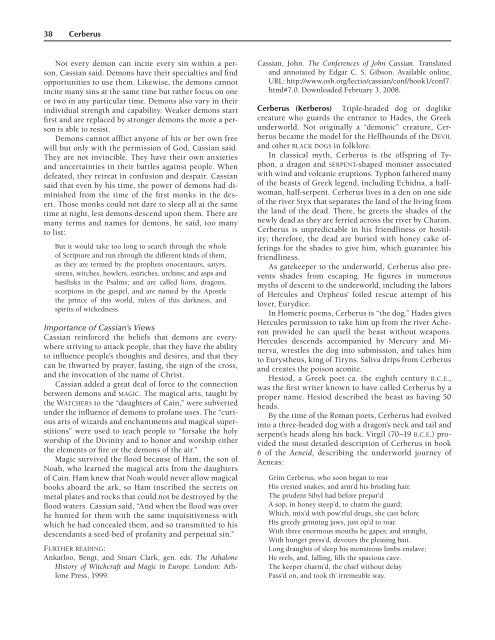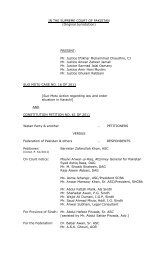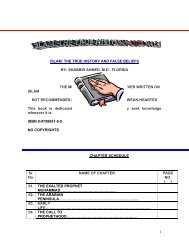The Encyclopedia Of Demons And Demonology
The Encyclopedia Of Demons And Demonology
The Encyclopedia Of Demons And Demonology
You also want an ePaper? Increase the reach of your titles
YUMPU automatically turns print PDFs into web optimized ePapers that Google loves.
38 Cerberus<br />
Not every demon can incite every sin within a person,<br />
Cassian said. <strong>Demons</strong> have their specialties and find<br />
opportunities to use them. Likewise, the demons cannot<br />
incite many sins at the same time but rather focus on one<br />
or two in any particular time. <strong>Demons</strong> also vary in their<br />
individual strength and capability. Weaker demons start<br />
first and are replaced by stronger demons the more a person<br />
is able to resist.<br />
<strong>Demons</strong> cannot afflict anyone of his or her own free<br />
will but only with the permission of God, Cassian said.<br />
<strong>The</strong>y are not invincible. <strong>The</strong>y have their own anxieties<br />
and uncertainties in their battles against people. When<br />
defeated, they retreat in confusion and despair. Cassian<br />
said that even by his time, the power of demons had diminished<br />
from the time of the first monks in the desert.<br />
Those monks could not dare to sleep all at the same<br />
time at night, lest demons descend upon them. <strong>The</strong>re are<br />
many terms and names for demons, he said, too many<br />
to list:<br />
But it would take too long to search through the whole<br />
of Scripture and run through the different kinds of them,<br />
as they are termed by the prophets onocentaurs, satyrs,<br />
sirens, witches, howlers, ostriches, urchins; and asps and<br />
basilisks in the Psalms; and are called lions, dragons,<br />
scorpions in the gospel, and are named by the Apostle<br />
the prince of this world, rulers of this darkness, and<br />
spirits of wickedness.<br />
Importance of Cassian’s Views<br />
Cassian reinforced the beliefs that demons are everywhere<br />
striving to attack people, that they have the ability<br />
to influence people’s thoughts and desires, and that they<br />
can be thwarted by prayer, fasting, the sign of the cross,<br />
and the invocation of the name of Christ.<br />
Cassian added a great deal of force to the connection<br />
between demons and MAGIC. <strong>The</strong> magical arts, taught by<br />
the WATCHERS to the “daughters of Cain,” were subverted<br />
under the influence of demons to profane uses. <strong>The</strong> “curious<br />
arts of wizards and enchantments and magical superstitions”<br />
were used to teach people to “forsake the holy<br />
worship of the Divinity and to honor and worship either<br />
the elements or fire or the demons of the air.”<br />
Magic survived the flood because of Ham, the son of<br />
Noah, who learned the magical arts from the daughters<br />
of Cain. Ham knew that Noah would never allow magical<br />
books aboard the ark, so Ham inscribed the secrets on<br />
metal plates and rocks that could not be destroyed by the<br />
flood waters. Cassian said, “<strong>And</strong> when the flood was over<br />
he hunted for them with the same inquisitiveness with<br />
which he had concealed them, and so transmitted to his<br />
descendants a seed-bed of profanity and perpetual sin.”<br />
FURTHER READING:<br />
Ankarloo, Bengt, and Stuart Clark, gen. eds. <strong>The</strong> Athalone<br />
History of Witchcraft and Magic in Europe. London: Athlone<br />
Press, 1999.<br />
Cassian, John. <strong>The</strong> Conferences of John Cassian. Translated<br />
and annotated by Edgar C. S. Gibson. Available online.<br />
URL: http://www.osb.org/lectio/cassian/conf/book1/conf7.<br />
html#7.0. Downloaded February 3, 2008.<br />
Cerberus (Kerberos) Triple-headed dog or doglike<br />
creature who guards the entrance to Hades, the Greek<br />
underworld. Not originally a “demonic” creature, Cerberus<br />
became the model for the Hellhounds of the DEVIL<br />
and other BLACK DOGS in folklore.<br />
In classical myth, Cerberus is the offspring of Typhon,<br />
a dragon and SERPENT-shaped monster associated<br />
with wind and volcanic eruptions. Typhon fathered many<br />
of the beasts of Greek legend, including Echidna, a halfwoman,<br />
half-serpent. Cerberus lives in a den on one side<br />
of the river Styx that separates the land of the living from<br />
the land of the dead. <strong>The</strong>re, he greets the shades of the<br />
newly dead as they are ferried across the river by Charon.<br />
Cerberus is unpredictable in his friendliness or hostility;<br />
therefore, the dead are buried with honey cake offerings<br />
for the shades to give him, which guarantee his<br />
friendliness.<br />
As gatekeeper to the underworld, Cerberus also prevents<br />
shades from escaping. He figures in numerous<br />
myths of descent to the underworld, including the labors<br />
of Hercules and Orpheus’ foiled rescue attempt of his<br />
lover, Eurydice.<br />
In Homeric poems, Cerberus is “the dog.” Hades gives<br />
Hercules permission to take him up from the river Acheron<br />
provided he can quell the beast without weapons.<br />
Hercules descends accompanied by Mercury and Minerva,<br />
wrestles the dog into submission, and takes him<br />
to Eurystheus, king of Tiryns. Saliva drips from Cerberus<br />
and creates the poison aconite.<br />
Hesiod, a Greek poet ca. the eighth century B.C.E.,<br />
was the first writer known to have called Cerberus by a<br />
proper name. Hesiod described the beast as having 50<br />
heads.<br />
By the time of the Roman poets, Cerberus had evolved<br />
into a three-headed dog with a dragon’s neck and tail and<br />
serpent’s heads along his back. Virgil (70–19 B.C.E.) provided<br />
the most detailed description of Cerberus in book<br />
6 of the Aeneid, describing the underworld journey of<br />
Aeneas:<br />
Grim Cerberus, who soon began to rear<br />
His crested snakes, and arm’d his bristling hair.<br />
<strong>The</strong> prudent Sibyl had before prepar’d<br />
A sop, in honey steep’d, to charm the guard;<br />
Which, mix’d with pow’rful drugs, she cast before<br />
His greedy grinning jaws, just op’d to roar.<br />
With three enormous mouths he gapes; and straight,<br />
With hunger press’d, devours the pleasing bait.<br />
Long draughts of sleep his monstrous limbs enslave;<br />
He reels, and, falling, fills the spacious cave.<br />
<strong>The</strong> keeper charm’d, the chief without delay<br />
Pass’d on, and took th’ irremeable way.












